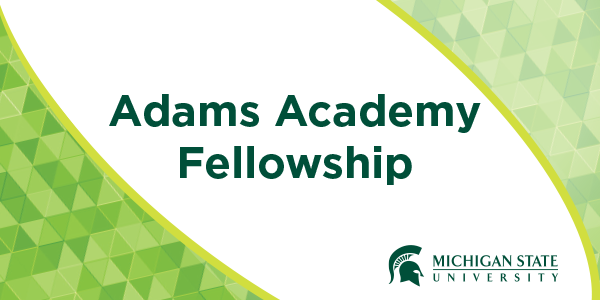
Background
The Adams Academy is named in honor of former MSU President Walter Adams and his wife and MSU faculty member emerita, Pauline Adams, in recognition of their sustained commitments to promoting instructional excellence.
Description
This annual OFASD program brings together a cross-disciplinary group of faculty and academic staff for a year-long fellowship focused on advanced topics in teaching and learning. The Adams Academy is named in honor of former MSU President Walter Adams and his wife and MSU faculty member emerita, Pauline Adams, in recognition of their sustained commitments to promoting instructional excellence. With this legacy in mind, over the course of the academic year, Adams Academy fellows:
- complete communal and self-directed readings on educational theory and practice;
- meet monthly to discuss select teaching and learning topics; and
- develop a paper or presentation on a self-selected educational topic or technique; or a reflective essay.
Adams Academy participants explore the literature on effective university teaching and learning practices and consider how this robust body of research can guide instructional decisions in the courses we teach and the learning experiences we design. Participants learn from and contribute to a community of teacher-scholars committed to excellence in teaching and learning in its various settings. Up to twelve Adams Academy members will be selected for the 2022-2023 cohort. Criteria for selection include evidence of the applicant’s interest in and commitment to teaching and learning, the potential to be an excellent teacher, and the potential and willingness to serve as a mentor and advocate for excellent teaching among peers. Each participant will be provided with $3,000 to be used for professional development related to teaching and learning.
Questions driving monthly discussions will include how do we determine what we ought to teach? Which ideas and voices will we amplify through our classrooms? And which are we quieting or excluding, accidentally or otherwise? What comprises an inclusive learning environment? How can we observe and assess learning? What are the consequences of these and other choices educators make for the individual student and the cultures and societies in which they live? What does it mean to say a practice is good or bad or best? And what does it mean to say a student or teacher or program is succeeding or struggling?
To address these questions and many others, we’ll have attended to perspectives beyond our own, be they voiced by our immediate colleagues or the texts we’ll read together. In doing so, we’ll help each other reflect on the curricula we’ve experienced, reimagine those we hope to create, and consider how our aspirations connect to the learners we engage with.
Participants
All tenure-system faculty, fixed-term faculty, academic staff, and librarians are encouraged to apply. A stipend will be given to each fellow for professional development activities.
Application Process
The application process for 2025-2026 is now closed. Application dates for 2026-2027 will be announced in early spring 2026.

